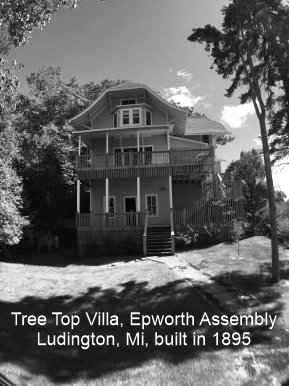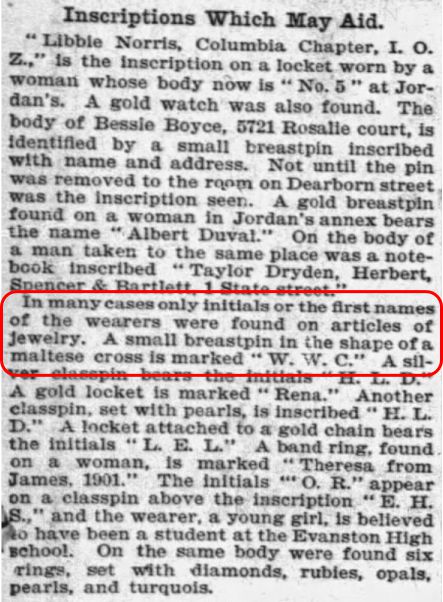|
Samuel Thrall Cooper (1824–1892), father of Charles
and Willis, followed his father into the Methodist
ministry, serving for a time in Indianapolis as
pastor for the
Park Methodist Church. In 1878, retired
from the ministry as well as a fruit basket
manufacturing company, Samuel and his sons purchased
six used sewing machines, hired operators and set up
in a livery stable manufacturing stockings in St.
Joseph, Michigan as S.T. Cooper & Sons.
Most mills then sold through jobbers. Samuel
pioneered the practice of selling directly to retail
merchants. The company prospered when it began
producing high-quality wool socks for lumberjacks.
Cooper's three sons, Willis, Henry S. (1858–1924)
and Charles, were employed at the company as well,
Willis in the office and Henry in the plant. Charles
had graduated from De Pauw University (where Samuel
had been a Trustee) in 1886. Willis attended
but did not graduate from Valparaiso University.
West to Kenosha
In 1894, after Samuel Cooper's death, Willis sold
the family interest to Abel Wells. Henry Cooper took
a job for a time at Dow Chemical while Willis and Charles
purchased a controlling interest in the Chicago-Rockford Hosiery in Kenosha.
They remained involved in Michigan, however, spending time in St. Joseph,
MI with relatives in the summer and for holiday reunions. As a founding member
of the Epworth League, a Methodist Episcopal missionary program
for youth, the family was instrumental in the development of
 what is now called the
Epworth Assembly, a seasonal resort in Ludington, MI. Their
cottage there, built in 1895, was named Tree
Top Villa. It remained a summer
destination for the children and grandchildren of
Willis and Charles into the 1950s. The family sold
the Lake Michigan cottage, which remains intact and
enjoyed by its current owners. See below.
what is now called the
Epworth Assembly, a seasonal resort in Ludington, MI. Their
cottage there, built in 1895, was named Tree
Top Villa. It remained a summer
destination for the children and grandchildren of
Willis and Charles into the 1950s. The family sold
the Lake Michigan cottage, which remains intact and
enjoyed by its current owners. See below.
In 1898 the company expanded into the men's underwear market,
which proved successful enough that in 1900 the firm
was incorporated as Coopers Underwear Company.
Four years later came a new manufacturing facility for
White Cat union suits at 60th & 23rd
avenue in Kenosha that remains today as Jockey
International's headquarters. Willis served as
President and general manager while Charles was
general superintendent. Business demands did
not hamper Willis's sense of spiritual
responsibilities. In '98, he ran for governor
of Wisconsin on a Prohibitionist platform. He
did poorly, coming in fourth in a seven-man race,
but was so busy with Methodist Church activities
that he may not have noticed.
By 1903 both Willis and Charles were respected for
their wealth and generosity. Willis was
instrumental in fundraising for Methodist Episcopal
ministries, in 1897 writing a book on the subject,
and Charles implemented a profit-sharing program for
employees. Charles, was a dedicated Mason and earlier
in the year had helped organize a Masonic Temple
Association in Kenosha.
|

|
Willis and family relocate to Chicago
As of 1900, Willis and his family
lived in the Sheridan Park neighborhood of Chicago,
where he worked part-time for the corporation and
part-time on behalf of the Methodist Church.
Charles remained in Kenosha, taking charge of operations,
though Willis retained a title and handsome salary.
Charles treated his employees with respect, and they turned
out in large numbers to silently watch his funeral parade.
Willis served as secretary for a new Methodist program called the
Twentieth Century Revival Commission, for which
he received no salary. By 1903 Willis headed a student
study program for the church, spending three days a week
on matters for Cooper Underwear. He retained his position
as general manager at an annual salary of $10,000,
inflation-adjusted to $300,000.
Willis and Charles were buried in the Green Ridge Cemetery in Kenosha.
In the years after the fire
Willis's wife survived him,
along with one married daughter. They were Anna Goodenow
Cooper of Goodenow, Illinois (1854–1928), and twenty-nine-year-old Maud
Cooper Beachel (1874–1957). Maude's
husband, Charles F. Beachel, became prominent in the
Methodist Church and Epworth Heights in Ludington.
Charles' wife, the former Flora Yocum of Ohio, had
died of pneumonia the previous year. He left behind two
orphaned children, twelve-year-old Ralph Y. Cooper (1891–1958)
and eight-year-old Carlotta (1895–1988).
They were raised by their grandmother and an aunt.
Ralph was chairman of the board at Jockey at the
time of his death. Carlotta lived to
ninety-three years of age and left behind a book of
her life story for her two daughters and
grandchildren.
The third brother, Henry Cooper,
became head of Cooper Underwear after the deaths of his brothers.
The largest life insurance
claim known to have been paid out for an Iroquois
Theater victim was for Willis Cooper. Two months
after the fire, the Philadelphia Casualty Company
paid $10,000 to his estate, coincidentally the
amount of his annual salary.
To-do about the will
Willis Cooper bequeathed approximately $80,000 each to the Methodist
Episcopal Church Missionary Society and Lawrence
University, an Appleton school associated with the
Methodist church. In April 1904, newspapers reported
that the church rejected the money because Cooper
had died in a theater, and the Methodist Church was
theologically opposed to theaters. The church
disputed that claim, attributing its rejection
instead to unspecified "hard terms" imposed by the
inheritance. The church later explained that the
will specified the entirety of the endowment be held
untouched for the lives of Anna and Maude. They were
to receive an annual allowance of 6% of the
principal (in some newspapers estimated at $2,500),
paid to them not from the principal but from
interest earned. At the deaths of Anna and Maud, the
church and university would gain full control of the
endowment. The church's stance was that the money
remaining after the Willis allowance was inadequate
for the effort required to manage the fund
(inflation-adjusted to $2.3 million). Anna Cooper
exercised a Wisconsin law giving her the right to
reject the allowance from the university and take
the inheritance as a lump sum.

Though Charles was the most involved in the Masons, it
is probable that his brother Willis W. Cooper was also a
member of the organization in Kenosha and that it was
his pin that the police cited in this list from January
1, 1904.
|
